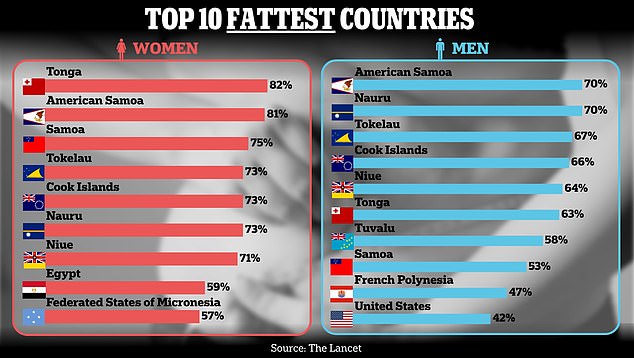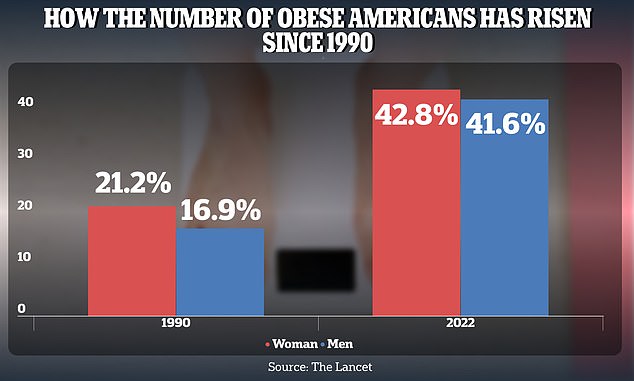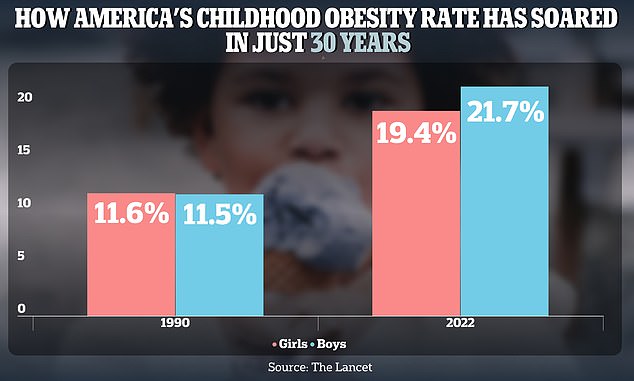For the first time, obesity has been declared a greater health threat than hunger: one billion people around the world are too fat.
Approximately 159 million children and adolescents and 879 million adults are so high in weight relative to their height that they are classified as obese, the equivalent of approximately one in eight people.
Meanwhile, rates of underweight fell among children and adolescents and more than halved among adults worldwide.
While the United States is often thought to be the most obese country in the world, its population of 139 million obese people pales in comparison to China’s 200 million or India’s 350 million.
And even when broken down in terms of population proportion, the United States ranks 10th among men and 36th among women among 190 countries, according to the new study published in The Lancet.
Your browser does not support iframes.

The places with the highest prevalence of obesity are Tonga, American Samoa, Polynesia and Micronesia, Cook Islands and Niue. The availability of unhealthy foods versus healthy foods is believed to be behind the rising rates of obesity in many island nations.
Obesity rates among young people quadrupled globally between 1990 and 2022, the latest year available, while rates among adults more than doubled, the researchers found.
This means that obesity is now the most common form of malnutrition in many countries, according to the study published in the Lancet medical journal.
The obesity rate among American adults increased from 21.2 percent in 1990 to 43.8 percent in 2022 for women and from 16.9 percent to 41.6 percent for men.
Over the same period, the rate nearly doubled from 11.6 percent to 19.4 percent among American girls and from 11.5 percent to 21.7 percent for boys.
In the United States, men had had the third-largest increase in obesity rates in the world during those two decades, just behind Romania and Qatar, the study showed.
The research team said there is an urgent need to make serious changes to the way we approach obesity.
Obesity can increase the risk of a multitude of serious health problems, including heart disease, type 2 diabetes, and some cancers.


The obesity rate among American adults increased from 21.2 percent in 1990 to 43.8 percent in 2022 for women and from 16.9 percent to 41.6 percent for men.


Between 1990 and 2022, the rate nearly doubled from 11.6 percent to 19.4 percent among American girls and from 11.5 percent to 21.7 percent for boys.
Lead author Professor Majid Ezzati, from Imperial College London, said: “It is very worrying that the obesity epidemic that was evident among adults in much of the world in 1990 is now reflected in school-aged children and adolescents. .
‘At the same time, hundreds of millions remain affected by malnutrition, especially in some of the poorest parts of the world.
“To successfully address both forms of malnutrition it is vital that we significantly improve the availability and affordability of healthy and nutritious foods.”
Globally, the obesity rate more than doubled in women, almost tripled in men, and more than quadrupled in girls and boys, between 1990 and 2022.
The places with the highest prevalence of obesity are Tonga, American Samoa, Polynesia and Micronesia, Cook Islands and Niue.
The availability of unhealthy foods versus healthy foods is believed to be behind the rising rates of obesity in many island nations.
There have been huge marketing campaigns encouraging unhealthy foods, and healthier options can be expensive and difficult to find.
Another key cause is a cheap, fatty type of meat called lamb ribs, which is imported from New Zealand.
In the mid-20th century, meat scraps, such as turkey tails from America and lamb briskets from New Zealand, began arriving in the Pacific Islands and were both cheap and popular.
Many Tongans are under the impression that something imported is superior and are not educated about how to eat healthily, Papiloa Foliaki, 82, a former nurse, activist and politician, who now works in the hotel business, told the BBC.
The data also showed that globally, in 2022, about 532 million people will be underweight, including 183 million women, 164 million men, 77 million girls and 108 million boys.
The countries with the highest prevalence of underweight in 2022 were Eritrea and Timor-Leste for women and Eritrea and Ethiopia for men, where more than 20 percent of the adult population was affected by underweight.
In 2022, obesity rates were higher than underweight rates among girls and boys in about two-thirds of the world’s countries.
The study was conducted by the NCD Risk Factor Collaboration, a network of health scientists from around the world, in collaboration with the World Health Organization (WHO).
Researchers used body mass index (BMI), which is calculated using weight and height, to understand how obesity and underweight have changed around the world over three decades.
The team compiled data from more than 3,000 population studies involving 222 million people.
The researchers said that although BMI is an imperfect measure of body fat, it is widely recorded in population surveys.
